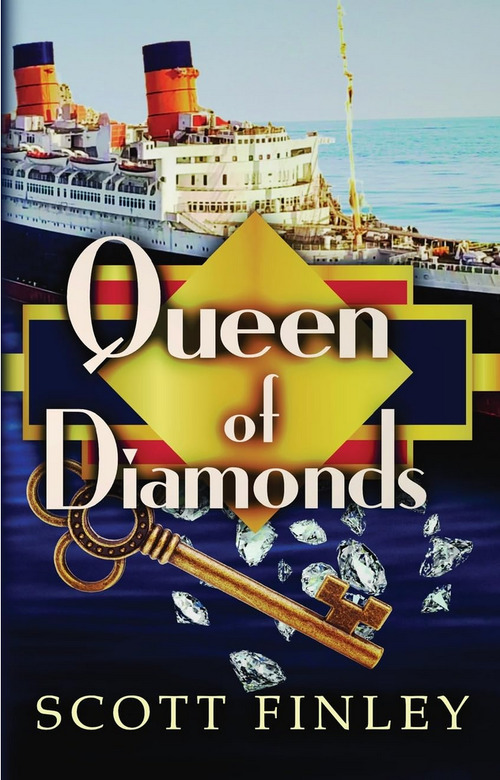 THE LOVE HATERS |
 Fall headfirst into July’s hottest stories—danger, desire, and happily-ever-afters await. |

Purchase
Voyages of the Queen Mystery Historical Excerpt of Queen of Diamonds by Scott FinleySunday, March 23, 1930 VIII The county fair, or show, would pop up in our town once a year, bringing with it clowns, dog races, massive draft horses – the descendants of those horses bred to carry the full weight of an armored knight and his weapons – as well as cows, chickens, goats, sheep, and other examples of animal husbandry. My brother and I would gorge ourselves on all the sweets, pies, pastries, and puddings we could get our sticky hands on while our parents walked slowly up and down the tables of exhibits, pausing first in front of this one and next in front of that one. Examples of knitting, of iron work, of gardening, of vegetables, of flowers crowded into each other, with the occasional blue ribbon from the judges attached to one. There were also rides on ponies, and a small carousel to make you dizzy, and swings, and swaying rope ladders to climb and ring a bell at the top for a prize. The most interesting to me, though, were the pitch men, the barkers, and the gamesmen. There was one fellow I remember being mesmerized by. I spent an hour trying to guess which of the three cups the ball was hiding under as he whisked them around on his board faster than my eye could follow. I never did win but looking back on it now I must have been good for business because he let me stand there quite a while, saying “Blimey, mates, even a little girl can play this game!” even though I never guessed it out. (In fairness he did let me win one or two, even though I hadn’t a tuppence to wager.) And now I was a big girl and still playing the game, and apparently my skills hadn’t improved much since the age of six. Was the box empty in the first place? Was it full? If the latter, was it carrying the false stones or was it carrying real stones? Again, if the latter, where did the false stones come from and where did the real stones go? All of these thoughts were jostling for space and attention in my head when I left Collins and made my way to the bridge to try and plan a Jewish funeral at sea. The Captain’s reaction to my request was really quite moving and no less in keeping with his character than I expected. “You wish to do what, Nurse Chandler?” he said, one eyebrow raising millimetrically. “Sir, Mr Isaac is Jewish. His nephew, who is also Jewish, states that in their religion the body must be buried as soon after death as possible. Landfall in Cherbourg is Friday morning, but of course the other option is that land is closer if we turn back to New York right now, but then there’s the matter of preserving the body. Embalming is not encouraged in the Jewish faith and what we can offer in the way of cold storage would count as embalming. The body would have to be offloaded at Cherbourg or Southampton to be embalmed, which, as I said, is frowned upon and then reloaded to make the trip back to New York.” “Why this ship? Why not another one?” “Sir, he purchased a round trip ticket on the Victoria. I’m no barrister but I think that’s a contract. Anyway, Doctor Harper considers it a health hazard. A burial at sea seems to be our only option.” The Captain stared down at me in that way he always did whenever we had a conversation, jaw muscles clenching beneath his beard. I managed a weak smile—usually one of my best defences – and was beginning to wonder what my Presbyterian funeral at sea would involve when there was a respective cough behind the Captain’s back. “Yes, Number One?” said the Captain, still looking at me. “Sir,” said First Officer Carter. “I think I might agree with Nurse Chandler and Doctor Harper about the burial at sea.” “You do, do you?” The Captain turned and scowled at him. “You’ve been my First Officer for five months and you’re already taking someone else’s side?”∗ “Sir,” said Carter, “I really think it’s for the best.” The Captain sighed and turned back to face me. “Fine, then. Nurse, if you don’t mind handling the preparations, all we need to know is when to bring the ship to a full stop. Mind you, I don’t expect to be at a full stop much more than twenty minutes.” He thoughtfully stroked his beard. “I will, of course, be happy to make any remarks as needed.” I mentally smacked myself. The Captain loved a stage. I should have led with that. “Thank you, sir,” I said. “Mister Collins is looking to see if we are carrying a rabbi among the passengers.” The Captain blinked at me. “But of course,” I added hurriedly, “I’m sure his nephew would be proud to have you say a few words.” “No doubt,” said the Captain. Was that a bit of preening I detected in him? “Have you informed Mister Casey of what’s happened?” “Yes, sir. As far as Mister Casey, passengers and crew know, Mr Isaac died of natural causes.” “Very well. Keep me informed, Nurse.” Doctor Harper was waiting for me when I finally returned to the hospital after noon. I was contemplating the gentle kindness of my bunk until whenever I might wake up, but as usual, it was going to have to wait. “Maeve,” said Harper. “How are you doing?” “I’m completely knackered, if you must know.” I related my visits with Collins and the Captain. “Everyone seems to be very busy,” I said, leaning against the desk. “But the Captain has given the go-ahead for the burial at sea.” “That’s good. When we get the time set I’ll ring Casey and he can add that to his story about Isaac dying in his cabin of natural causes.” “Thanks for doing that, Boss. You know I briefly toyed with keeping his death a complete secret, but with a burial at sea the entire ship will have to know about it.” I frowned. “There’s just not much disguising coming to a dead stop and disembarking a passenger into the ocean.” “Hard not to miss,” Harper conceded. “But it will give the passengers something to write home about.” “Stop it. You’re getting just as jaded as Mister Harvey.” “Not at all. Mister Harvey would have said something about giving the paying customers extra value for the money.” “Of course he would.” I sighed. “Mister Collins is looking through the passenger list to see if we’re carrying a rabbi who can officiate.” Harper nodded. “If not, we may be able to pull someone in from another ship via radio.” “That’s what I told Joel.” My eyes felt gritty. “I’m a little overwhelmed at the moment. Joel invited me to a dinner tonight with himself, Mr Winston, Mr Van Effen and Mr Perry.” “I’m sure it will be a feast of reason and flow of soul.” “Oh, and Alice is not just keeping Joel company. She’s taking over to sit with Mr Isaac while Joel is at dinner.” “Fine,” said Harper. “She can talk with him all she wants about the latest movies and he’ll never get bored.” I frowned. “What’s got you into this mood?” “Hard not to be in a mood when I get lab reports like this.” He held up a paper. “Blood sample results.” My tiredness temporarily left me. “And?” “Take a seat for this one.” I did as Harper directed and he held the paper out. “The first thing our dispenser noted was that the blood sample was cold; I had to tell him it was drawn off a dead man.” “To which Mister Reedy no doubt asked why.” Harper nodded. “I told him the whole story. After that experience last October, I didn’t expect him to be nonplussed and he wasn’t.” ∗ “Of course not,” I said. “Here’s his informal report. I’ll just touch on the high points, shall I? ‘Sample presented was heavy with alkaloids, placing it in category of muscle relaxant or some kind of neuro-muscular blocking agent. Note that onboard Victoria we use ether or succinylcholine for this purpose. Compound was apparently injected directly into the middle scalene muscle of the neck, with tip of injection needle breaking off at site.’” “Nothing we didn’t know already,” I said. I reached into my nursing smock and felt the wad of toilet paper. “I’ve still got the tip of the needle with me.” “Leave it on the desk, I’ll put it in an envelope later.” Harper resumed his story. “Now here’s where it gets strange. Reedy asked me an odd question: when I was a boy, did I ever read any of H. Rider Haggard’s works? King Solomon’s Mines or anything like that?” I nodded. “The African adventures? Spears and blowguns, hidden treasure? That sort of thing? My brother did. Couldn’t get enough of the stuff. Why?” “Let me go back to his report.” Harper cleared his throat and began to read again. ‘Consulting source book British Pharmaceutical Codex, 1929. I am copying the reference verbatim into this report. CURARA. species of Strychnos (N.O. Loganiaceae), probably mixed with other, possibly inert, substances. It is prepared as an arrow poison by tribes of Indians in British Guiana, French Guiana, Venezuala, Northern Brazil, and Colombia. I also consulted the 1918 edition of The Dispensatory of the United States of America. Again, I have copied the reference verbatim. This powerful South American arrow-poison was first brought to Europe by the celebrated traveler Waterton; it was in the form of a thick syrup, but as it now occurs in commerce it is a blackish extract, brittle, somewhat resinoid in appearance, encrusting the sides of gourds or little rude earthenware jars, into which it has been poured in a liquid state. The drug varies much in strength.’” Harper stopped reading and looked at me. My eyes were wide. “But this last bit is the most damning of all,” he said. “This is from the Codex.” “‘The principle effect of curare is to paralyze the motor nerve-endings in striped muscle, death occurring from respiratory failure. In larger doses, it also paralyzes nerve cells.’” I started to speak but Harper held up a finger and resumed reading. “‘Also from the Codex, I found this: INJECTIO CURARE HYPODERMICA, B.P.C. Hypodermic Injection of Curare. Make the Curare into a paste with some of the sterilised water, transfer the paste to a small funnel plugged with cotton wool, and gradually pour more of the water upon it until the required volume of filtered liquid is obtained. Dose. – 6 to 36 centimils (0.06 to 0.36 milliliters) (1 to 6 minims).’” “Bloody hell,” I said. surmise it was greater than what was called for in the Codex. I’m also unable to surmise if the drug came from Brazil proper or another location in Central America, but I can tell you that it was mixed with sterilised water. The only sterilised water on board Victoria is in our dispensing area and the hospital, and access is very limited and controlled, leading me to believe that the syringe was ready for use before it ever came on board.”’ I shook my head. “If Reedy’s conjecture is right, then someone came on board carrying that syringe with the express intent of using it in just the manner it was used. This wasn’t any crime of the moment; the door locked from the inside and the diamonds used to choke him and the prepared syringe of curare mean it was absolutely thought out well in advance.” The telephone rang and I picked it up. “Hospital, Nurse Chandler. Yes. And he’s willing? All right, thank you, Mister Collins. I’ll get a time set.” I hung up the receiver. “Well, at least that went right. We do have a rabbi on board and he’s consented to do the service for Mr Isaac at ten tomorrow morning on the fantail. Rabbi Aaron Hoffman. Could you please get that to Mister Casey?” Harper jotted the information down as I hoisted myself up out of the chair, yawned and stretched. “Is it really only 12:30?” I asked. “Afraid so. Of course, you were out late last night.” “Seems like a hundred years ago.” I pulled out my compact and checked my face in the mirror. “Looks like a hundred years ago, too.” Harper crossed his arms. “I’m going to give you a prescription. Go get some sleep.” “And miss all of this fun?” I shook my head. “Not hardly.”
Excerpt from Queen of Diamonds by Scott Finley |
|
| |||
|
||||




 © 2003-2025
© 2003-2025